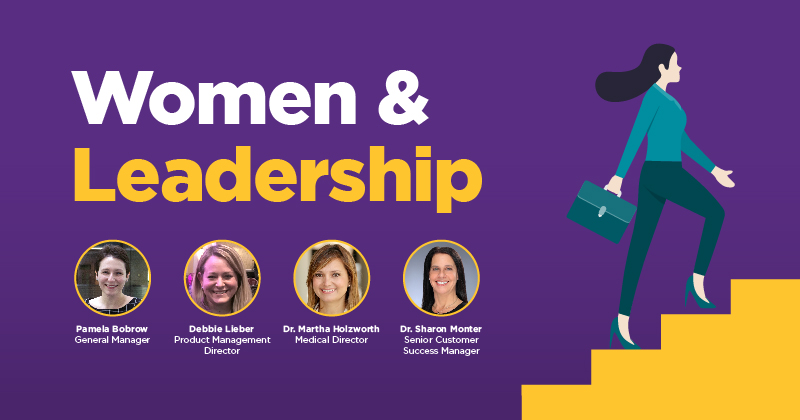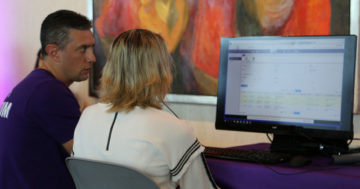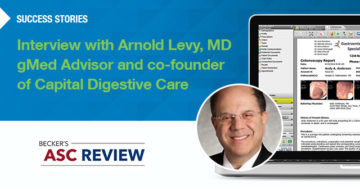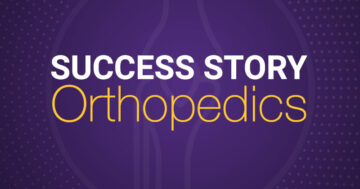Meet the Women Who are Advancing Podiatry and Technology at ModMed®

While the number of women in podiatric medicine has increased steadily over the last few decades, research shows that women podiatrists were more likely to spend more time in a clinical setting, be less satisfied with work, and experience higher work stress levels than their male colleagues.
A similar storyline has played out for women in the technology field. Here, women report being underpaid, underrepresented and often discriminated against.
While this research seems to suggest that there’s still much room for change, many women have found rewarding careers in both fields. That’s certainly true of the women who hold leadership positions on the ModMed Podiatry team, where podiatrists and technologists work together to build and code award-winning* podiatry software.
Recently we caught up with a few of our product leaders and on-staff physicians. Here’s what they had to say about being women leaders in podiatry — in their own words. The interview below has been edited for length and clarity.
ModMed: Who or what inspired you to get involved in podiatry/technology?
Sharon Monter, DPM: I’ve always wanted to be a doctor, more specifically a dermatologist. When I was growing up, we had a close family friend who was a dermatologist and the plan was for me to take over his practice when I graduated from medical school. Through his connections, I received an early acceptance to medical school in Albany, New York. While this was exactly what I always wanted, I just couldn’t see myself spending four to eight years in the cold weather, and to everyone’s disbelief, including my own, I said, “no, thank you.” I heard about podiatry school and thought it would be an interesting field. Podiatry has allowed me to do everything that I always wanted to do. I am the dermatologist, the pediatrician, the vascular specialist — I get to do it all and I love it!
Martha Holzworth, DPM: For me it was a matter of meeting the right people at the right time. I was an undergrad at the University of Georgia. I was premed and started shadowing a ton of professionals in the medical field. Right away I noticed that the DPMs were well-rounded, genuinely happy people. They weren’t anxious, burned-out or frustrated like the osteopathic counterparts I had met. I also liked that you could really do what you wanted to do with your practice, whether it was reconstructive work, in-office procedures or conservative care. Shadowing a lot of fantastic doctors during undergrad was what inspired me the most.
Pam Bobrow: Debbie and I came to ModMed through the acquisition of ICS, the company our father founded back in 1986. That acquisition took place almost two years ago. We worked for our dad for almost 20 years and he was the defining factor that got us involved in podiatry.
Debbie Lieber: I also have a background in nursing. So, when my dad asked me to join the business, I was able to fill a clinical need and help him build the notes portion of the program.
ModMed: What can help women be successful, particularly in male-dominated fields? Is mentorship important?
Holzworth: I might be generalizing here, but I think that women are so good at multitasking, time management, planning and staying organized. The skills that male-dominated workplaces need — we’ve been perfecting those for years, while taking care of our jobs and our families. Women also need to realize that it’s okay to be feminine. It’s okay to be your authentic self — and there’s power in that.
I think women should make the effort to connect with like-minded female colleagues and truly support each other. It doesn’t matter if you have the same level of responsibility or not — embrace yourself and embrace your female colleagues.
Monter: So I agree with everything you said, Martha. I’d also add that in order for us to be successful in a field that is male-dominated, we have to be determined. We have to want it. We have to be organized. We have to be thoughtful about it. These are some of the things that we bring to the table as women.
I also think it’s important to surround yourself with strong role models. It’s very, very important that we have people that we can look to if needed. As for mentorship, I think it depends on the person. I don’t know that everyone needs a mentor but there should always be somebody, or maybe a few people, that you go to when you have questions about what to do, why to do it, and how to do it. Somebody that you can just run things by, no matter what it is, and there’s no judgment. They’ll just answer any questions that you may have.
Lieber: Yes, mentors can help you understand the lay of the land and support you when you need help finding your way. My father was my mentor.
Bobrow: My dad was also my mentor. He challenged and trusted me every single day. I learned so much by observing and listening to him across the hall from me and at conferences. I had to learn to work fast and efficiently to be able to accomplish all of the things we needed to. I also was lucky to find another mentor in Dr. Michael Brody. Dr. Brody taught me all that he knew regarding EHR compliance and government requirements. He always wanted to help. The great thing about mentorship is that you don’t have to reinvent the wheel. You can learn, tweak and improve on an ongoing basis when you can exchange ideas with a mentor.
ModMed: What lesson from your experiences can you share that is unique to being a female leader?
Bobrow: When I was handed a leadership role, I took it seriously because it was my family’s business. I did not have to climb a corporate ladder, I just went in and worked as hard as I could every day. I listened intently, with an open mind, so I could learn as fast as possible. I cared about the employees, customers and my family. It was our life.
I would also say that being a mother inspired my leadership style and how I approach taking care of my team at work and my family at home.
Holzworth: Yes — having certain gut instincts and a maternal way of going about decisions can be very beneficial to your team and your purpose. One lesson that I learned through my experience was not to suppress my femininity, but to embrace it.
Monter: A lesson I learned was that if you want to do something, you can do it — even if it wasn’t your original plan. And if you have questions, you have to learn to surround yourself with people who are going to be on your team and who are going to support you in any endeavor — not hold you back. I’ve been fortunate to find both men and women who have supported and helped me along the way. I’ve been pretty lucky.
ModMed: What are some assumptions, biases, or other challenges you’ve faced as a female leader in podiatry/tech?
Holzworth: Either you’re too sweet or you’re not sweet enough. Either you’re a voice to be heard, or you’re not. And sometimes, if you’re too loud, you can come off as berating someone. That bias has been the hardest for me to break through.
Monter: Martha, I don’t know if you experienced this, but I remember being a resident and wearing the exact same “uniform” that my male counterparts were wearing: scrubs, a white coat, and a nametag. But when I walked by a patient’s room, they yelled “Nurse, nurse!” At first it’s kind of funny, like — what do they know? But eventually, the fact that, being a woman, I wasn’t seen as a doctor by the patients, started to concern me.
Holzworth: To this day, I can walk into a conference and people will say, “Oh, you’re the orthopedic rep!”
Bobrow: When I’m at trade shows, clients and other vendors sometimes assume that I’m not in a leadership role and immediately ask one of my male colleagues if they can speak to a “higher up.”
Lieber: I’ve had similar experiences at trade shows. However, as a nurse, I didn’t feel that I was treated differently from anyone else. Yes, it was a female-dominated field, but I also felt that the doctors respected me. Here at ModMed, I’ve never felt like I was treated differently because I’m a woman.
ModMed: Do you have any other stories you’d be willing to share?
Holzworth: When I was just coming out of residency, I came across this six-doctor group. The practice was near to where I grew up and I thought it would be perfect. One of my attendants was part of the group and he told me, “Well it’s too bad that you’re female, because you’re about to start having kids, and that’s just not going to work with our group.”
Monter: One male doctor that I worked with for years told me that I would never be a good mother and a good podiatrist at the same time. That’s a really terrible thing to say to a woman, especially when you’re right out of residency and you think the world is your oyster. Some might be tempted to rethink everything they’ve ever thought about themselves. Initially, I was shocked that someone would even say this. After the shock wore off, I was angry and it only made me work harder and of course, leave that job. You have to believe in yourself. You have to believe that you can be a great parent and a great podiatrist — and I am.
ModMed: What risks have you taken that helped get you where you are today?
Bobrow: I don’t think of them as risks; more like opportunities. I choose to say “yes,” and if it doesn’t work out, I’ll look for something else and have that experience. I just try to do the best I can in everything that I do. That’s what we were taught, and what I had to do to grow a business.
When I worked at ICS, I wasn’t handed a specific role. I came in and figured out where I could fill a gap, made my own way and did what needed to be done based on the business goals.
Lieber: Moving from nursing to a different career was my biggest risk. I took the leap because I wasn’t happy being a manager where I was — I went on some interviews for nursing and I wasn’t sure where I wanted to go. I had gotten engaged, life was moving on, and I wanted to live closer to home. My dad offered me the job and I took it. I didn’t know how it was going to turn out, if I would like it, or what it entailed, but wanted to try it anyway.
Holzworth: My biggest risk was trusting the group and the people that initially hired me after residency. When I became part of that group, I had to trust them with my personal and professional vision. Not to just deliver the best foot and ankle care, but also to make it the one place people think of when they want that kind of care.
Monter: My biggest risk professionally was when I decided to go out on my own and open my own practice — and I’m glad I did. About five years ago, I took another big risk and accepted a position with NEMO Health/TRAKnet (which is now part of ModMed). Since most of my patients have been with me for years, they are like family, so it was hard for me to reduce my hours and spend less time with them — but I made the right decision and they’re happy for me and continue to be my patients to this day.
Holzworth: I agree. It was a big risk to put some practice time aside for ModMed, but I wanted to embrace the bigger vision. The technology that we’re building — we want to bring it to the whole country and really expand it. I’m excited to share our solutions with my colleagues because they are truly life-changing — and that’s worth the risk.
ModMed: What advice do you have for women who want to pursue a career in podiatry or technology?
Bobrow: Just do it. Say “yes” to opportunities and don’t let doubt creep into your brain. Whether you’re a woman or not, work hard, set your mind to it, and go for it! Let your skills and strengths guide you. Don’t make assumptions. Listen to what’s being said instead of waiting for your turn to speak. So many people want to talk, and you miss opportunities if you don’t listen.
Monter: Podiatry is a great field for a woman. You’re able to have both your practice and your family. If you have your own practice, or a very understanding boss, you’re able to schedule around your children so that you’re not missing out on their activities. This is one of the things that I was very grateful for. There aren’t that many emergencies that wake you up in the middle of the night and take you away from young children — depending on what kind of practice you have, of course — which is helpful.
Holzworth: I cannot overemphasize the importance of shadowing, because that’s how you will see what Sharon is describing. That’s how you see it live. Everyone practices a little bit differently — there’s different groups, different settings. There are a lot of really exciting things happening in podiatry — the future looks really bright. Put statistics aside, go shadow and see it for yourself.
ModMed: Are you working on any exciting projects right now that you’d like to talk about?
Bobrow: Podiatry is just taking off in a really beautiful way. Debbie, our product leader, is working on so many unique podiatry-specific features that make this a truly specialty-specific platform. We already had a lot, but this just takes us to the next level. We’ve also recently launched ModMed AMP to help with providers marketing their practices, increasing their patient load and improving efficiencies.
ModMed truly cares about the clients and the staff. The care of the podiatry community that ModMed founders Dan and Michael have shown is really special.
Lieber: I specifically want to mention the local coverage determinations (LCDs). I’m very excited about the workflows for at-risk foot care and hopefully expanding that to other LCDs. Streamlining the onboarding here at ModMed is a priority, from onboarding to training and implementation, and we’d like the product to help our new users as much as possible. Switching EHRs can be overwhelming for clients since there is so much change management involved.
Monter: I am doing a doctor-direct video series. The purpose of this is to show our users how to document within our EHR, EMAⓇ, so that they have a place to go to see the workflow. We’ve also started a customer success initiative where I’m reaching out to our newly onboarded clients to check in and see how things are going, and answer any questions that they may have. We want our new clients to know that our goal is to see them succeed and we’re here to help them do so.
Holzworth: We have so much going on! One of the greatest things about our EHR, EMA, is that it allows us to document in a way that is very comprehensive for podiatry, not just to document the criteria that’s necessary for reimbursements and medical legal documentation, but also, and very importantly, to achieve our goals of parity with our allopathic counterparts, parity with our orthopedic and musculoskeletal colleagues, and parity among female doctors and non-female doctors. I think that parity is super important and your documentation has to reflect that. We are helping to validate that females are doing exciting things in the field of podiatry, and that we are just as equal, just as capable, but bring different things to the table. I love that, and I’m super passionate about it. My personal mission does not end until the client becomes an ambassador for EMA. That’s how I define my success.
ModMed: This question is for our on-staff podiatrists. How do you run your practices, do your work with ModMed, and still have time to spend with your families?
Monter: This is my job. This is what I do. My kids are now older so it’s easier and I explain to them that I see patients at certain times in the office and I stay home at certain times. If you love what you do, it’s not work. That’s really what it comes down to.
Holzworth: I think that comes with a lot of sacrifice, and it’s okay. I embrace it. I really do. I feel that there are some times when life puts you through challenges that you need to face — not so much for yourself, but for the needs of others, and that includes your family. And when you ask me where I get the strength, well, I get it from my faith.
ModMed: Do you have any additional thoughts you’d like to leave us with?
Holzworth: I just hope for a better future for my daughter and my son. We definitely need to teach our daughters that they can do anything that they want to do. Despite what anybody else tells them, they can make their own future. The world is theirs to achieve and enjoy.
But I also want to teach my son that it is not okay just to live in a patriarchal world. That diversity is not something just to be talked about, but is something to be experienced and to advocate for.
We’ve come a long way, but there are still more glass ceilings to break and more work to be done. It goes beyond podiatry and technology — there’s a level of social justice that needs to happen. But if women continue to work together and support each other, there’s no telling what we can do.
Our Panel of Women Leaders
Pam Bobrow, General Manager, Podiatry
Pamela Bobrow has been in the EHR industry for 20 years. She joined ModMed in 2021 through the acquisition of her family’s company, ICS Software, which specialized in podiatry-specific EHR software. Through the years, Pam has worked in all areas of the business, which helped her learn, grow and understand how to operate the business. In 2017, she graduated from NYU Stern with an MBA focusing on IT management.
Pam lives in South Florida with her daughter and two dogs. She is a musician at heart who loves learning each and every single day.
Martha Holzworth, DPM, Medical Director, Podiatry
Martha Holzworth serves as the team lead for podiatry, where she focuses on designing and developing foot- and ankle-focused content for podiatrists and orthopedic specialists. She is a board-certified foot and ankle specialist practicing in Boca Raton, where she’s on staff at Boca Raton Regional Hospital and Boca Raton Outpatient Laser and Surgery Center.
Debbie Lieber, Product Management Director, Podiatry
Debra (Debbie) Lieber is a director of podiatry at ModMed. Debbie received a BS in biology and a minor in chemistry from SUNY Oneonta and a BS in nursing from Johns Hopkins University School of Nursing, where Debbie served as president of her class during her time at Johns Hopkins. After working as a nurse for four years in the CTICU (Cardiothoracic Intensive Care Unit) at New York Presbyterian Hospital at Cornell, she went to work for her father, Ken Katz, at ICS Software. At ICS Software, Debbie held many roles, including customer support manager, sales director, and training manager. Debbie enjoys drawing, dancing and spending time with her family. She lives with her husband, two children and one dog (bernedoodle) in Oceanside, NY.
Sharon Monter, DPM, Senior Customer Success Manager, Podiatry
Dr. Sharon Monter is a licensed physician in the state of New Jersey. She received her medical degree from the New York College of Podiatric Medicine. Dr. Monter completed three years of residency at Gouverneur Hospital in Manhattan, NY, Bergen Regional Medical Center in Paramus, NJ, and Peninsula Hospital in Queens, NY, where she served as the chief resident. Dr. Monter is a past president of the New Jersey Podiatric Medical Society, the chairperson of the NJPMS Central Division and continues to serve on the state board of the New Jersey State Podiatric Medical Society. She is also a state representative to the APMA House of Delegates. She continues to treat patients in her private practice.
*2022 Black Book™
This blog is intended for informational purposes only and does not constitute legal or medical advice. Please consult with your legal counsel and other qualified advisors to ensure compliance with applicable laws, regulations and standards.







